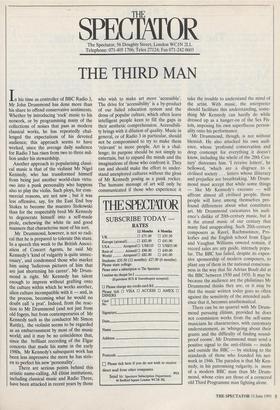SPECATOR
The Spectator, 56 Doughty Street, London WC1N 2LL Telephone: 071-405 1706; Telex 27124; Fax 071-242 0603
THE THIRD MAN
In his time as controller of BBC Radio 3, Mr John Drummond has done more than his share to offend conservative sentiments. Whether by introducing 'rock' music to his network, or by programming many of the collections of noises that pass as modern classical works, he has repeatedly chal- lenged the expectations of his devoted audience; this approach seems to have worked, since the average daily audience for Radio 3 has risen from two to three mil- lion under his stewardship.
Another approach to popularising classi- cal music is that of the violinist Mr Nigel Kennedy, who has transformed himself from being just another world-class virtu- oso into a punk personality who happens also to play the violin. Such ploys, for com- mercial reasons, are not new ; but it was less offensive, say, for the East End boy Stokes to become the maestro Stokowski than for the respectably bred Mr Kennedy to degenerate himself into a self-made prole, eschewing the white tie and good manners that characterise most of his sort.
Mr Drummond, however, is not so radi- cal that he is prepared to tolerate this stunt. In a speech this week to the British Associ- ation of Concert Agents, he said Mr Kennedy's 'kind of vulgarity is quite unnec- essary', and condemned those who market him using 'ludicrous pictures of him that are just shortening his career'. Mr Drum- mond is right. Mr Kennedy has talent enough to impress without grafting onto the culture within which he works another, alien culture incompatible with it — and, in the process, becoming what he would no doubt call 'a prat'. Indeed, from the reac- tion to Mr Drummond (and not just from old fogeys, but from contemporaries of Mr Kennedy such as the conductor Mr Simon Rattle), the violinist seems to be regarded as an embarrassment by most of the music world; and it may be no coincidence that, since the brilliant recording of the Elgar concerto that made his name in the early 1980s, Mr Kennedy's subsequent work has been less impressive the more he has striv- en to perfect his new 'personality'.
There are serious points behind this artistic name-calling. All elitist institutions, including classical music and Radio Three, have been attacked in recent years by those who wish to make art more 'accessible'. The drive for 'accessibility' is a by-product of our failed education system and the dross of popular culture, which often leave intelligent people keen to fill the gaps in their aesthetic comprehension. Accessibili- ty brings with it dilution of quality. Music in general, or of Radio 3 in particular, should not be compromised to try to make them 'relevant' to more people. Art is a chal- lenge; its purpose should be not simply to entertain, but to expand the minds and the imaginations of those who confront it. They can and should make the effort to under- stand unexplored cultures without the gloss of Mr Kennedy posing as a punk rocker. The humane message of art will only be communicated if those who experience it take the trouble to understand the mind of the artist. With music, the interpreter should facilitate this understanding, some- thing Mr Kennedy can hardly do while dressed up as a hanger-on of the Sex Pis- tols, imposing his own superfluous person- ality onto his performance.
Mr Drummond, though, is not without blemish. He also attacked his own audi- ence, whose 'profound conservatism and deep contempt for everything it doesn't know, including the whole of the 20th Cen- tury' distresses him. 'I receive letters', he bellowed, 'which are a disgrace to a civilised society . .. letters whose illiteracy and prejudice are breathtaking.' Mr Drum- mond must accept that while some things — like Mr Kennedy's excesses — will affront almost all civilised people, those people will have among themselves pro- found differences about what constitutes art. Mr Drummond caricatures his audi- ence's dislike of 20th-century music, but it is the atonal music of our century that many find unappealing. Such 20th-century composers as Ravel, Rachmaninov, Pro- kofiev and the English school from Elgar and Vaughan Williams onward remain, if record sales are any guide, intensely popu- lar. The BBC has failed, despite its expen- sive sponsorship of modern composers, to plant any of them in the national conscious- ness in the way that Sir Adrian Boult did at the BBC between 1930 and 1950. It may be because the audience are the philistines Mr Drummond thinks they are; or it may be that the music written today goes so often against the sensitivity of the intended audi- ence that it, becomes anathematical.
There can be no quarrel with Mr Drum- mond pursuing elitism, provided he does not commission works from the self-same musicians he characterises, with customary understatement, as `whingeing about their grants and the difficulty of finding sound- proof rooms'. Mr Drummond must send a positive signal to the anti-elitists — inside and outside the BBC — by sticking to the standards of those who founded his net- work in 1946. The paradox is that Mr Ken- nedy, in his patronising vulgarity, is more of a modern BBC man than Mr Drum- mond, whose cries are those of a cornered old Third Programme man fighting alone.


















































 Previous page
Previous page